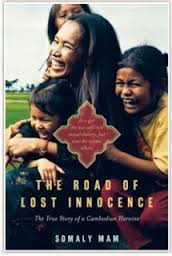 This past week, our class read and discussed the book, The Road of Lost Innocence by Somaly Mam (2005). The book tells the story of her early life, her experience being trafficked into the sex trade, and her efforts to change her life and rescue other young victims in Cambodia. Mam started two foundations, AFESIP (Acting for Women in Distressing Situations) and the Somaly Mam Foundation. She has helped raise millions of dollars to build shelters in Cambodia, Thailand, Vietnam and Laos and to rescue hundreds of girls from the sex trade. In May of 2014, Simon Marks, wrote an expose in Newsweek that accused Mam of fabricating some details of her early life, stating that she was a voluntary prostitute, not someone enslaved in the sex trade. He also said that some of the rescued girls had been instructed to lie about and sensationalize their pasts so the foundation could raise more money, and he said that while Mam was charming and charismatic in public, many said she was privately “tyrannical,” “moody,” “eractic,” and “entitled.” The board of her foundation hired a law firm to do an independent investigation and asked for her resignation after the story appeared. Shortly thereafter, the Somaly Mam Foundation closed.
This past week, our class read and discussed the book, The Road of Lost Innocence by Somaly Mam (2005). The book tells the story of her early life, her experience being trafficked into the sex trade, and her efforts to change her life and rescue other young victims in Cambodia. Mam started two foundations, AFESIP (Acting for Women in Distressing Situations) and the Somaly Mam Foundation. She has helped raise millions of dollars to build shelters in Cambodia, Thailand, Vietnam and Laos and to rescue hundreds of girls from the sex trade. In May of 2014, Simon Marks, wrote an expose in Newsweek that accused Mam of fabricating some details of her early life, stating that she was a voluntary prostitute, not someone enslaved in the sex trade. He also said that some of the rescued girls had been instructed to lie about and sensationalize their pasts so the foundation could raise more money, and he said that while Mam was charming and charismatic in public, many said she was privately “tyrannical,” “moody,” “eractic,” and “entitled.” The board of her foundation hired a law firm to do an independent investigation and asked for her resignation after the story appeared. Shortly thereafter, the Somaly Mam Foundation closed.
Mam did not grant an interview or attempt to defend herself for six months. Finally, in September of 2014, she spoke with Abigail Pesta for the French magazine, Marie Claire. Mam maintained her innocence and said her foundation board wanted her to sign a statement admitting guilt, which she refused to do. Pesta did her own investigation with many of the same sources used by Newsweek and found many inconsistencies with several sources saying they were incorrectly quoted in Newsweek or denying altogether the conclusions drawn in that article. Mam also noted that she herself often confused dates and times in her early life because things were so chaotic and she did not even know her real birth date. Newsweek essentially called Mam a fraud and Marie Claire called out Newsweek saying, “Of course, people can change the stories they tell…Nevertheless, taken as a whole, my findings raise questions about the picture Newsweek painted of Somaly Mam.” No one disputes the good work that was done by Mam’s foundations or that she has recently sold her home and her car to try and keep them operational.
This controversy raises several important questions for discussion:
(1) Marks asks one of these questions in his article, “She (Mam) has done so much for so many, does it matter that key parts of her story aren’t true?”
(2) Can any of the sources be viewed as reliable in a country where people have a fear of speaking out to officials, where corruption is rampant and many have hidden agendas? What are we to believe?
(3) What do these stories say about our own American notions of gender and activism? It is striking that journalists seem to investigate activists like Rigoberta Menchu and Somaly Mam to try and discredit their life stories yet never deny the good works they have done? Do we just not like heroes or hypocrites posing as heroes or does their gender play a role in our perceptions of the validity of their accounts? Holly Mathews, January 22, 2016